Charles E W Bean, Diaries, AWM38 3DRL 606/273/1 - 1918 - 1937 - Part 6
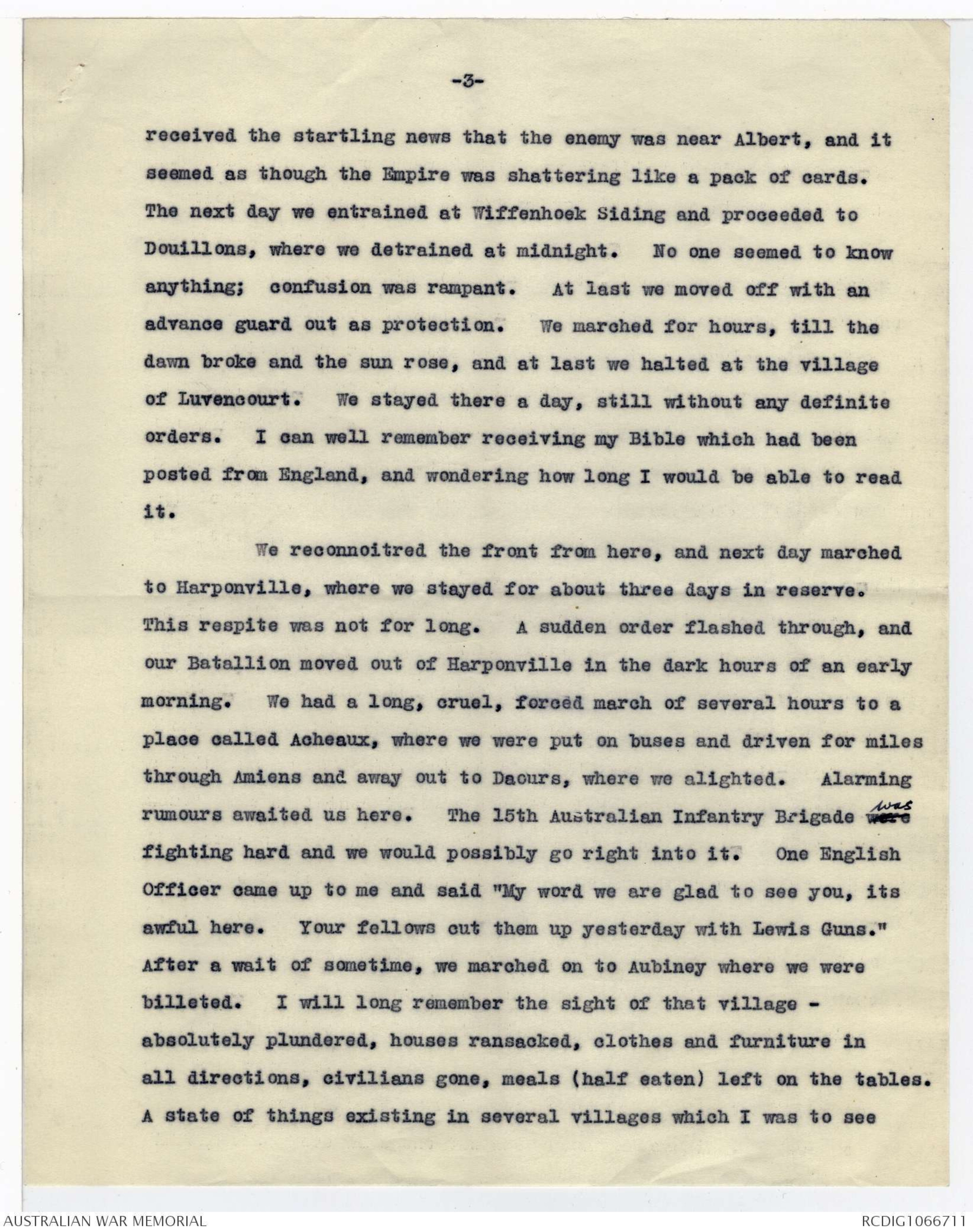
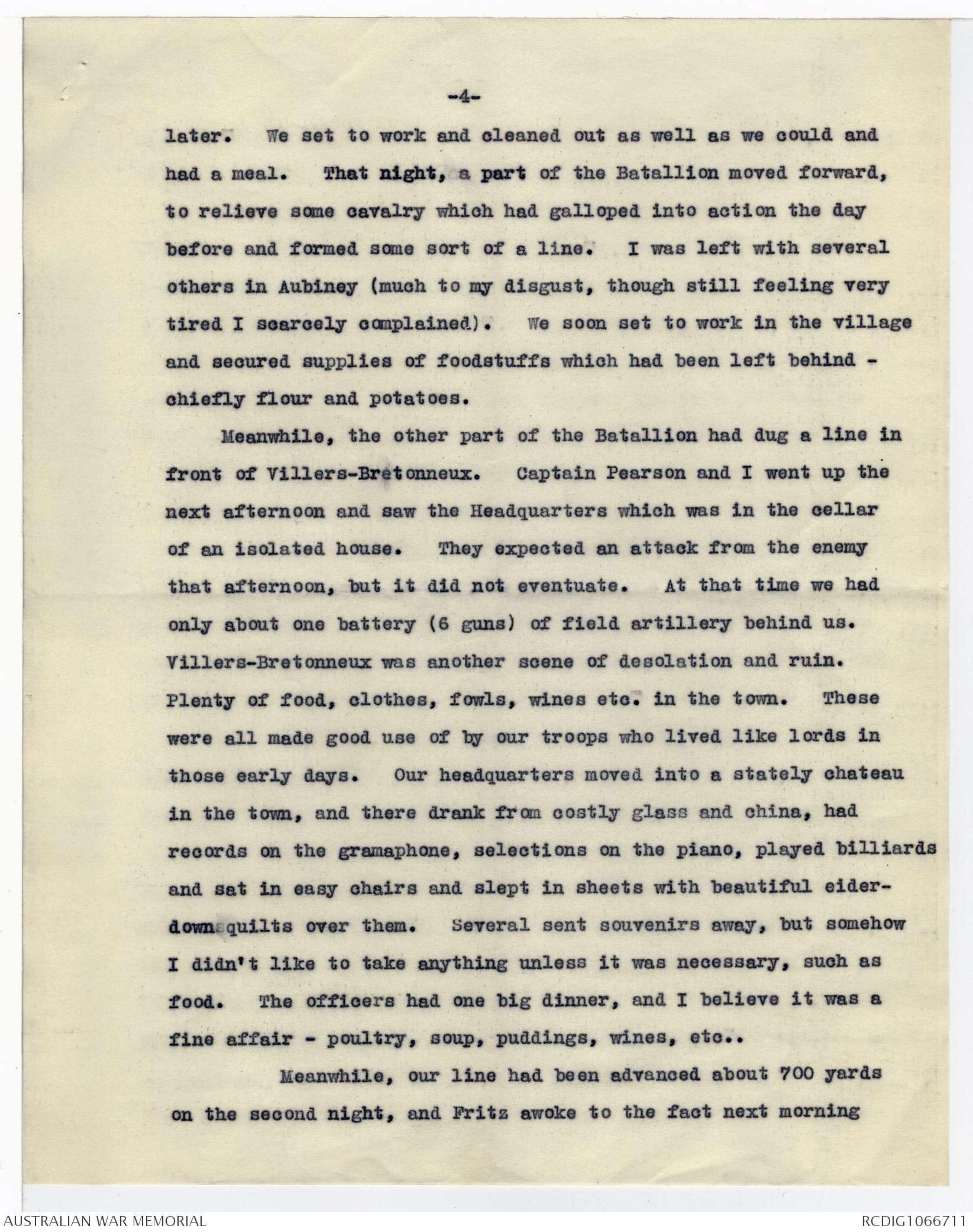
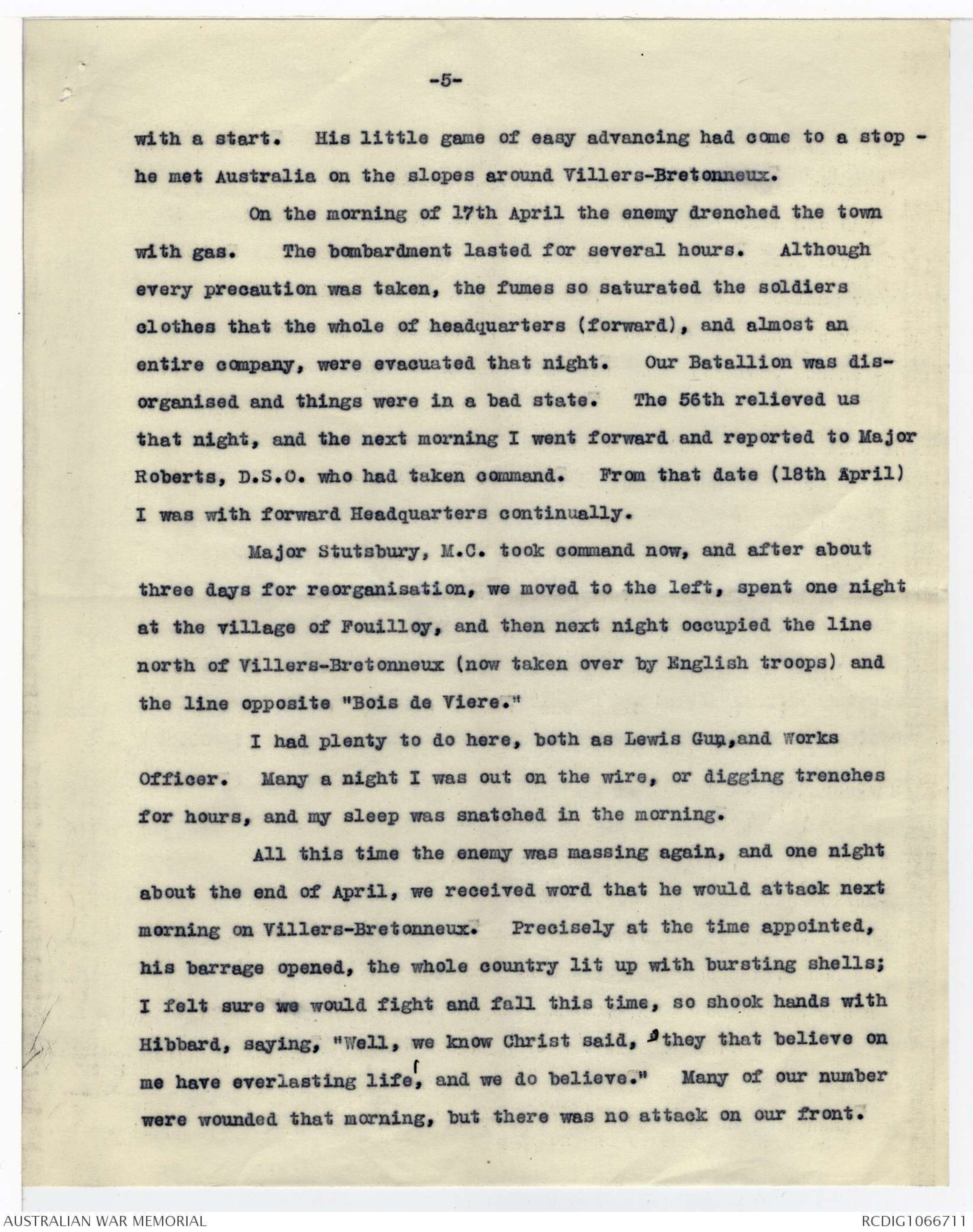
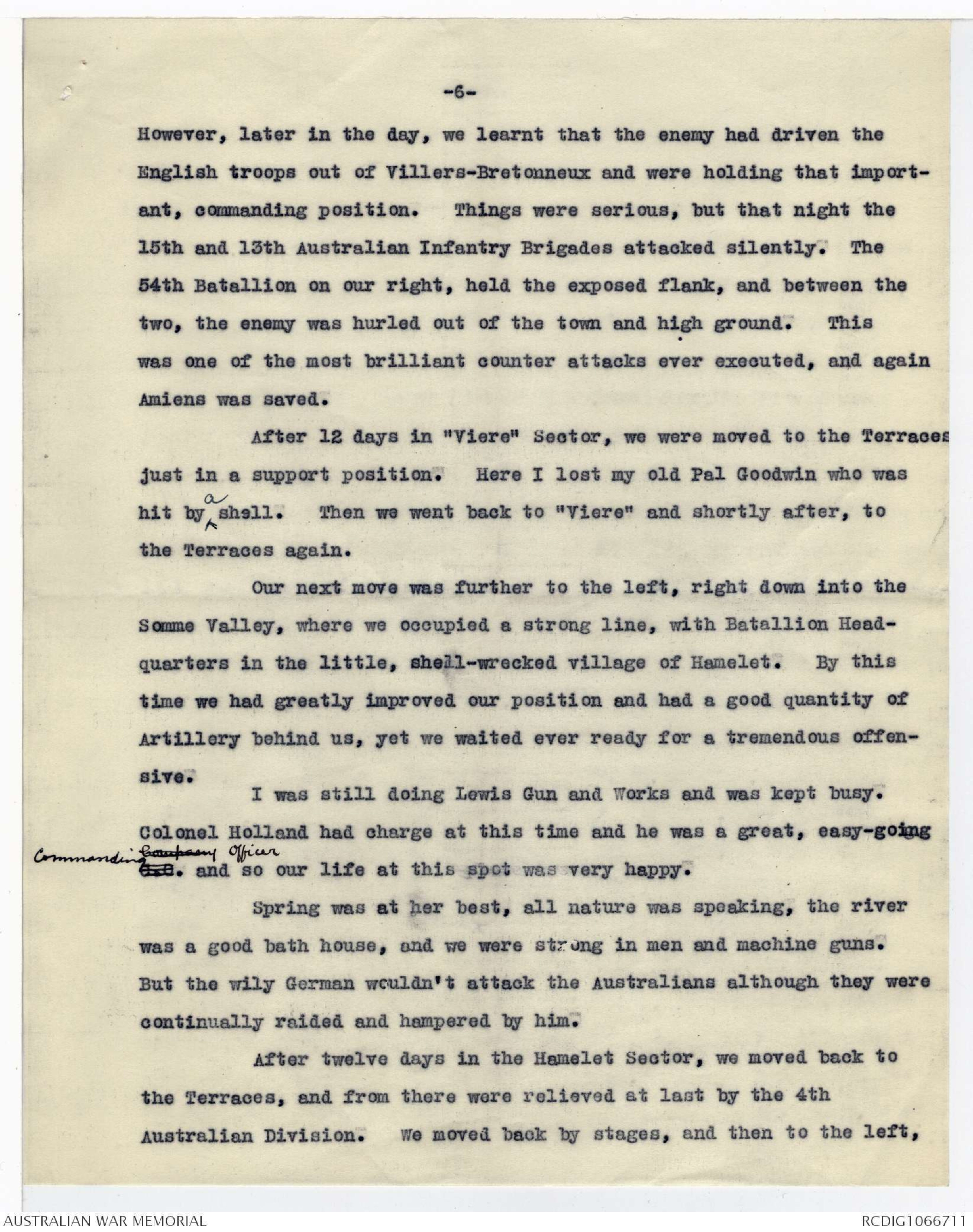
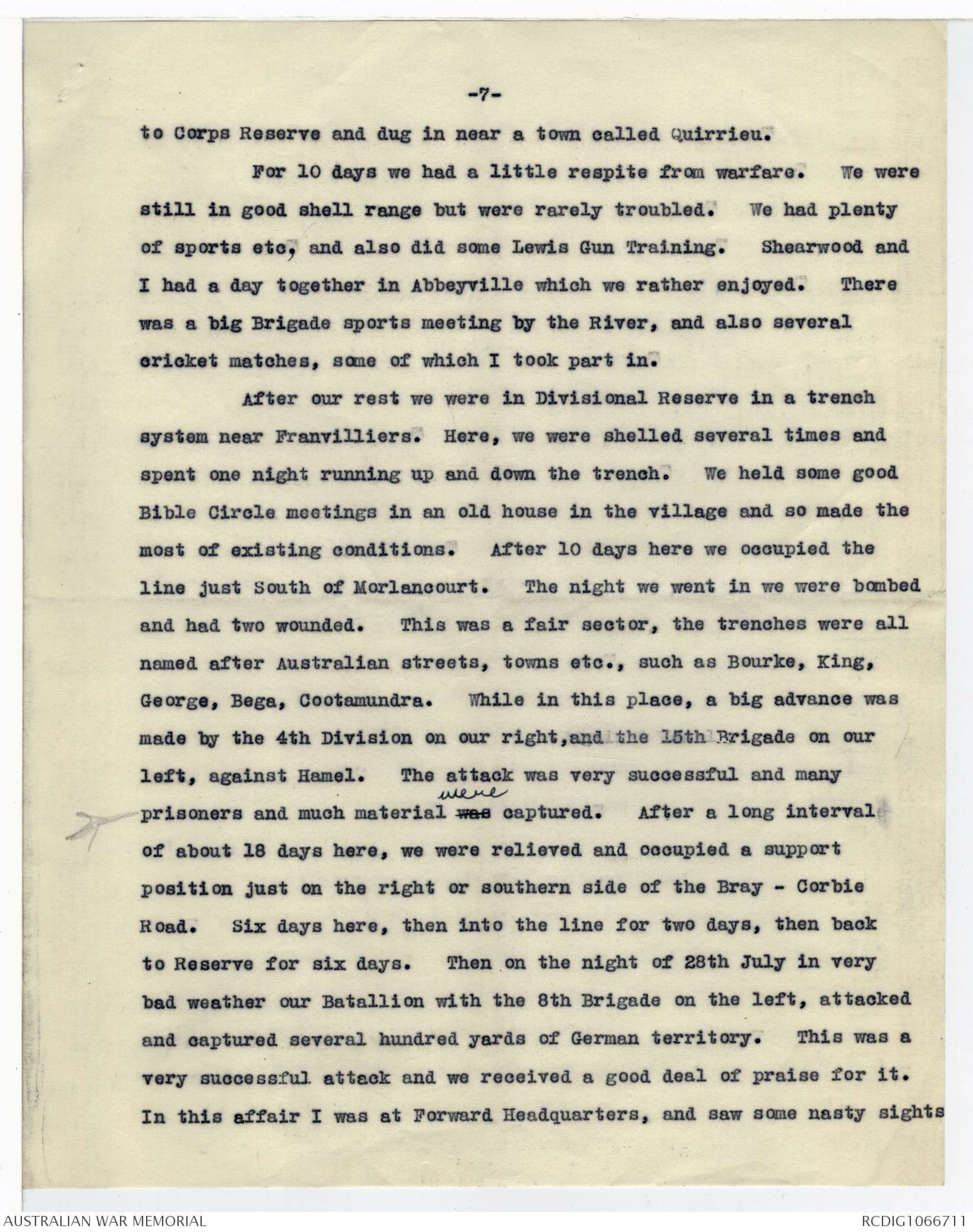
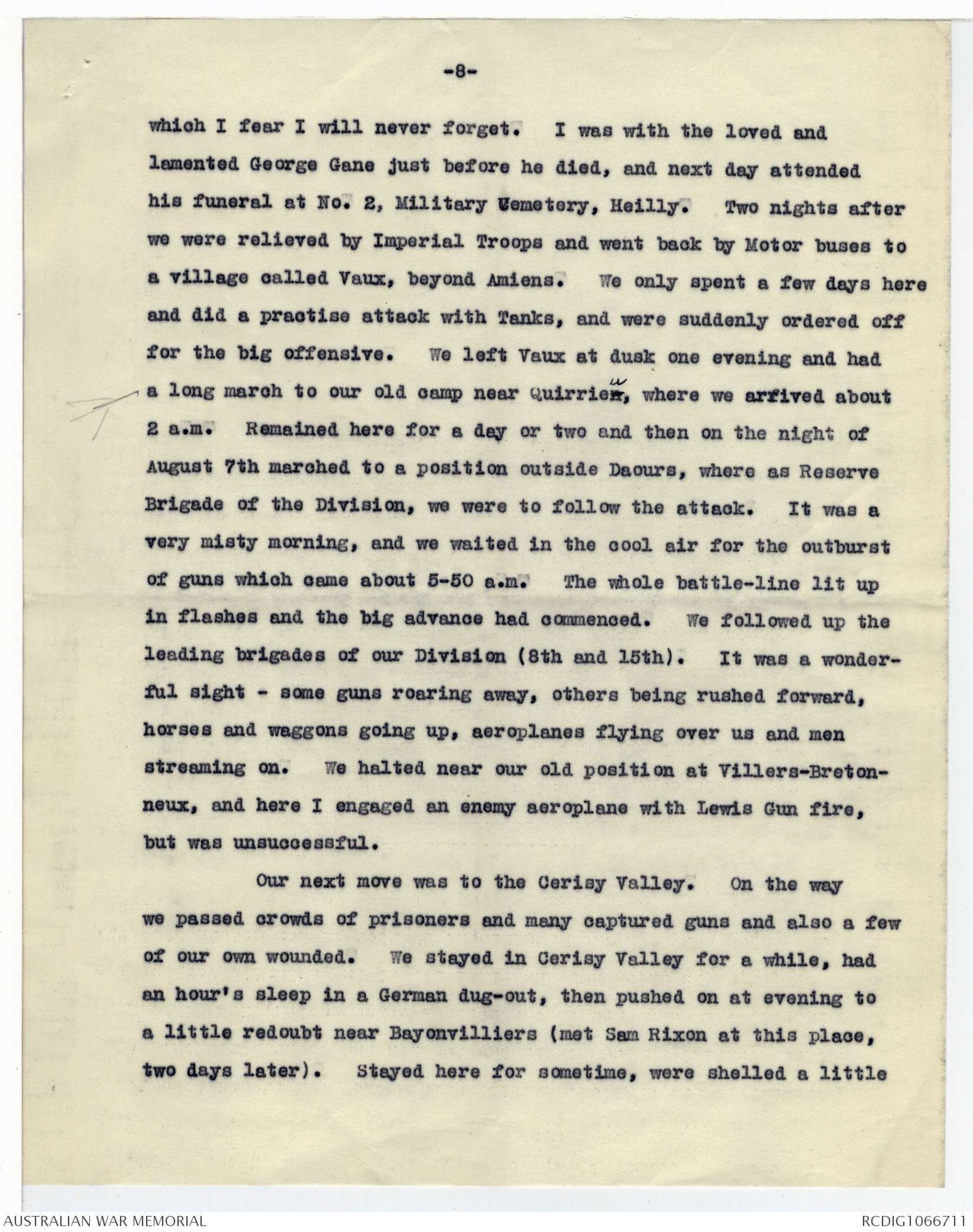
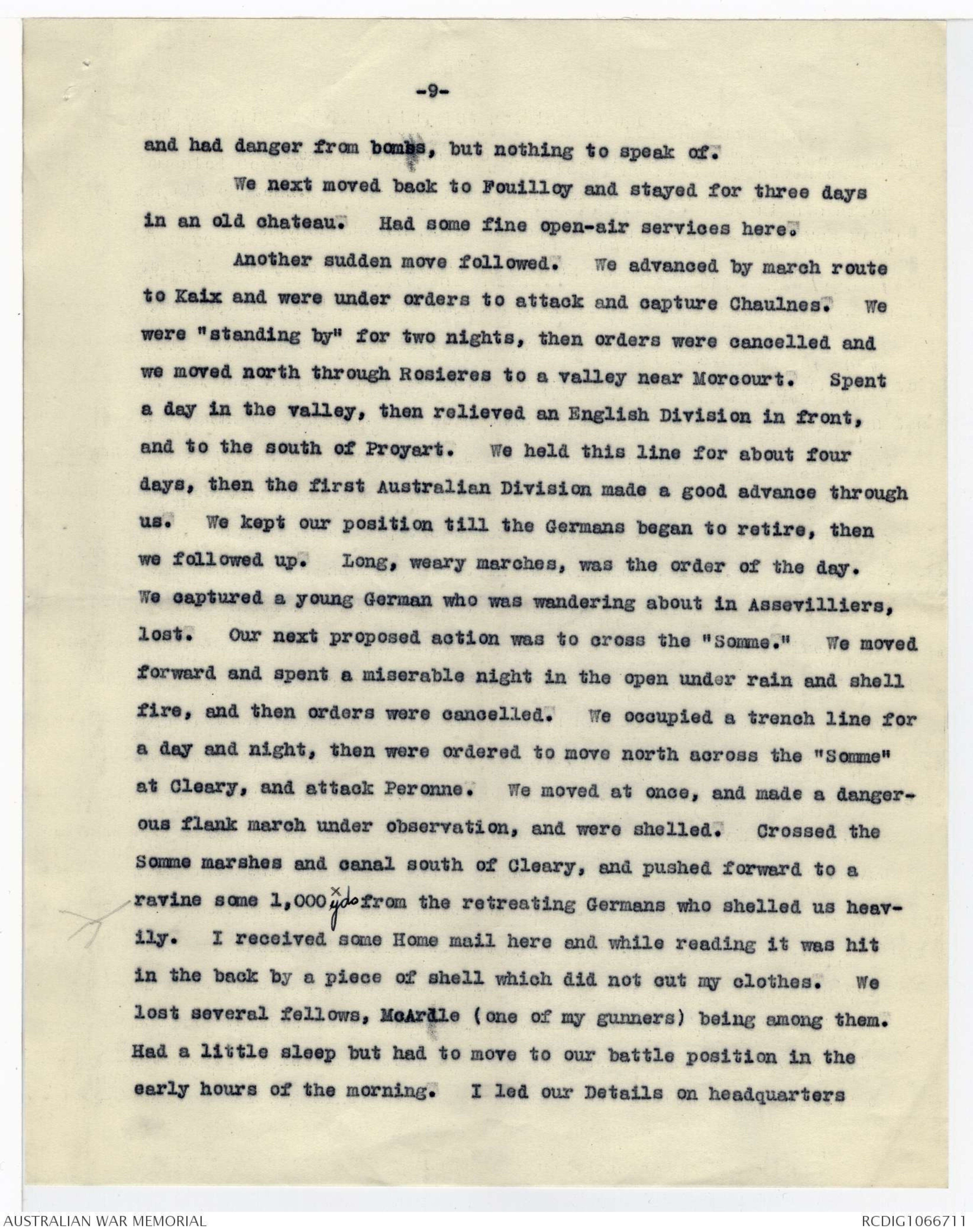
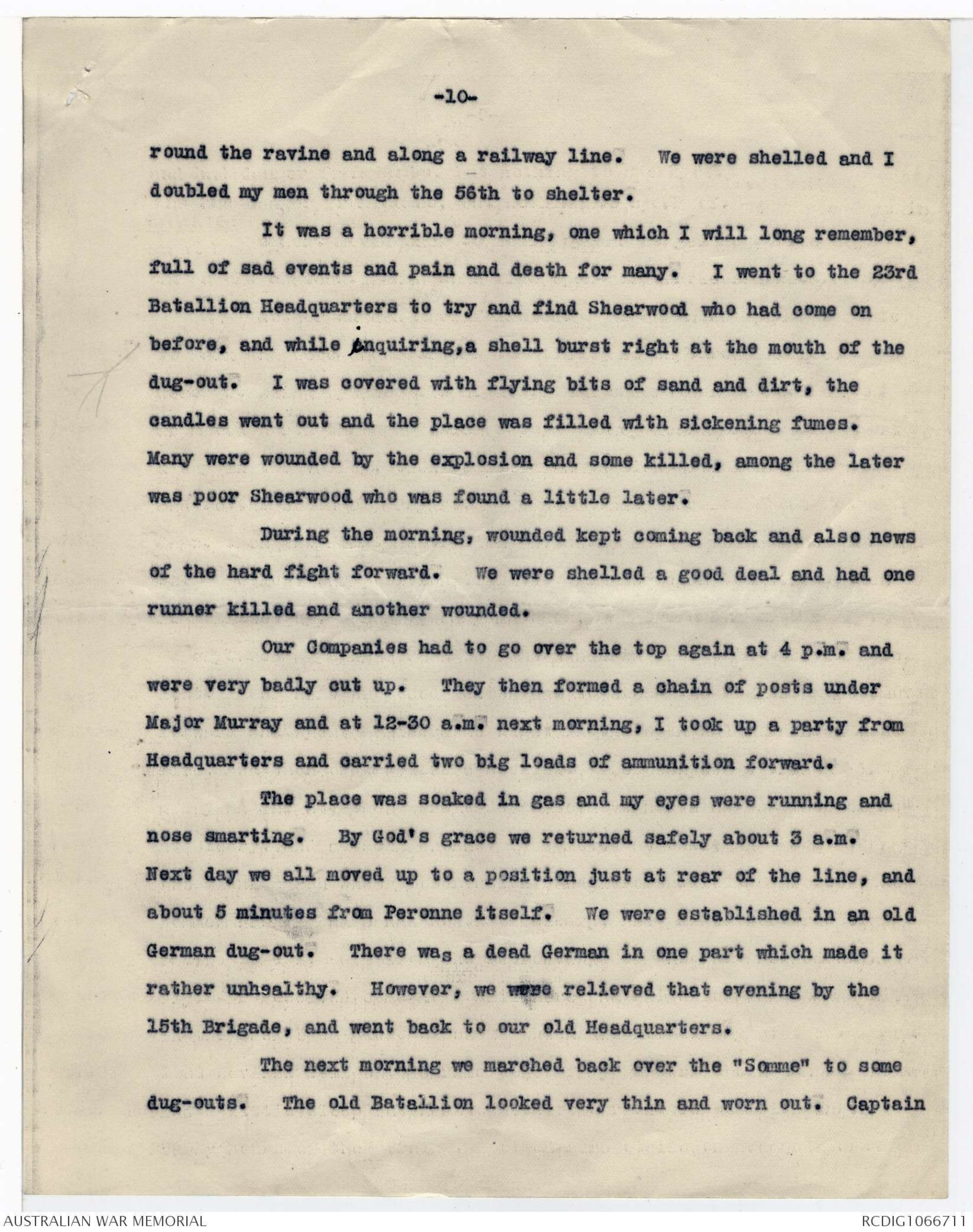

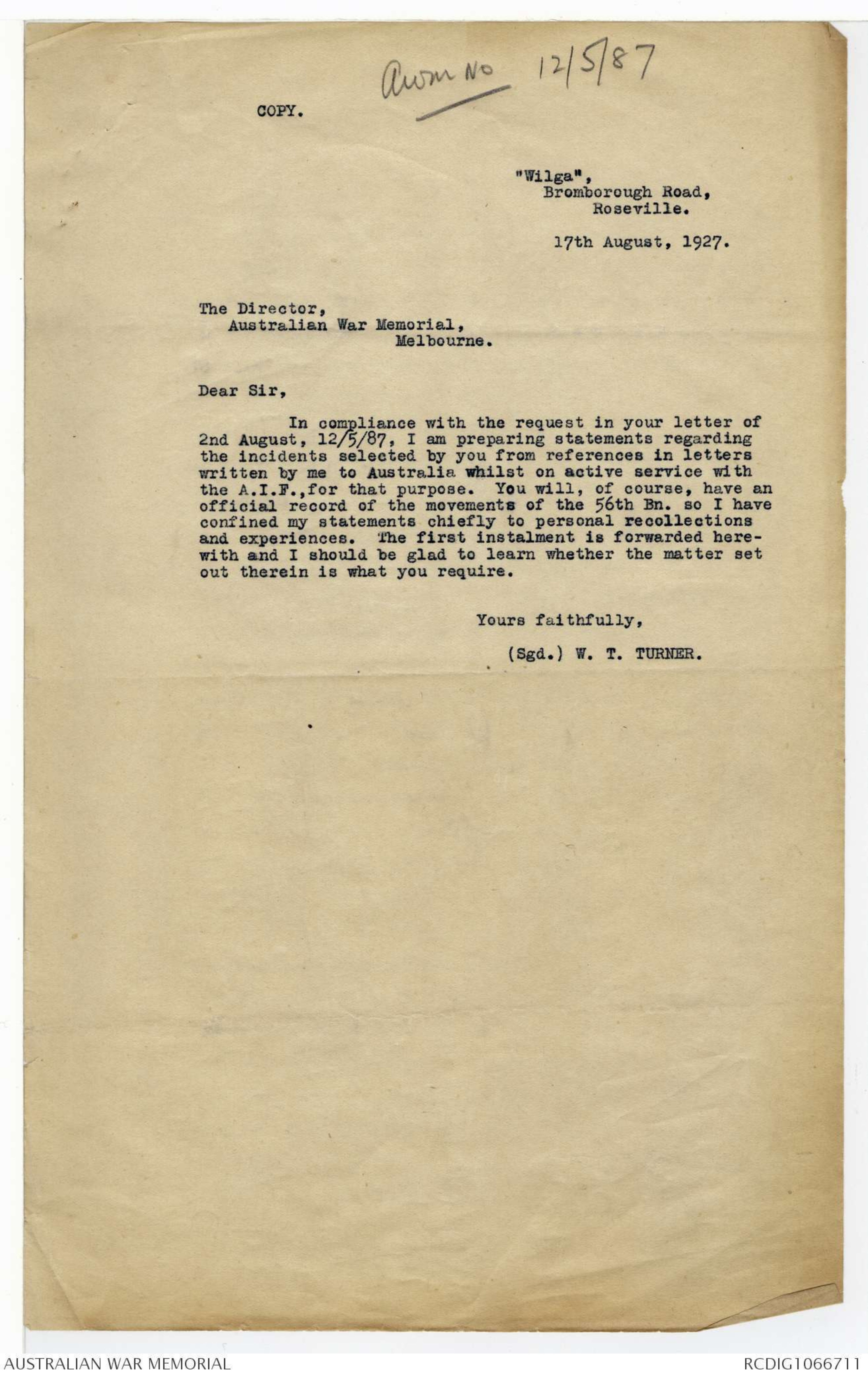
-3-
received the startling news that the enemy was near Albert, and it
seemed as though the Empire was shattering like a pack of cards.
The next day we entrained at Wiffenhoek Siding and proceeded to
Douillons, where we detrained at midnight. No one seemed to know
anything; confusion was rampant. At last we moved off with an
advance guard out as protection. We marched for hours, till the
dawn broke and the sun rose, and at last we halted at the village
of Luvencourt. We stayed there a day, still without any definite
orders. I can well remember receiving my Bible which had been
posted from England, and wondering how long I would be able to read
it.
We reconnoitred the front from here, and next day marched
to Harponville, where we stayed for about three days in reserve.
This respite was not for long. A sudden order flashed through, and
our Batallion moved out of Harponville in the dark hours of an early
morning. We had a long, cruel, forced march of several hours to a
place called Acheaux, where we were put on buses and driven for miles
through Amiens and away out to Daours, where we alighted. Alarming
rumours awaited us here. The 15th Australian Infantry Brigade were ^was
fighting hard and we would possibly go right into it. One English
Officer came up to me and said "My word we are glad to see you, its
awful here. Your fellows cut them up yesterday with Lewis Guns."
After a wait of sometime, we marched on to Aubiney where we were
billeted. I will long remember the sight of that village -
absolutely plundered, houses ransacked, clothes and furniture in
all directions, civilians gone, meals (half eaten) left on the tables.
A state of things existing in several villages which I was to see
-4-
later. We set to work and cleaned out as well as we could and
had a meal. That night, a part of the Batallion moved forward,
to relieve some cavalry which had galloped into action the day
before and formed some sort of a line. I was left with several
others in Aubiney (much to my disgust, though still feeling very
tired I scarcely complained). We soon set to work in the village
and secured supplies of foodstuffs which had been left behind -
chiefly flour and potatoes.
Meanwhile, the other part of the Batallion had dug a line in
front of Villers-Bretonneux. Captain Pearson and I went up the
next afternoon and saw the Headquarters which was in the cellar
of an isolated house. They expected an attack from the enemy
that afternoon, but it did not eventuate. At that time we had
only about one battery (6 guns) of field artillery behind us.
Villers-Bretonneux was another scene of desolation and ruin.
Plenty of food, clothes, fowls, wines etc. in the town. These
were all made good use of by our troops who lived like lords in
those early days. Our headquarters moved into a stately chateau
in the town, and there drank from costly glass and china, had
records on the gramaphone, selections on the piano, played billiards
and sat in easy chairs and slept in sheets with beautiful eiderdown
quilts over them. Several sent souvenirs away, but somehow
I didn't like to take anything unless it was necessary, such as
food. The officers had one big dinner, and I believe it was a
fine affair - poultry, soup, puddings, wines, etc..
Meanwhile, our line had been advanced about 700 yards
on the second night, and Fritz awoke to the fact next morning
-5-
with a start. His little game of easy advancing had come to a stop -
he met Australia on the slopes around Villers-Bretonneux.
On the morning of 17th April the enemy drenched the town
with gas. The bombardment lasted for several hours. Although
every precaution was taken, the fumes so saturated the soldiers
clothes that the whole of headquarters (forward), and almost an
entire company, were evacuated that night. Our Batallion was disorganised
and things were in a bad state. The 56th relieved us
that night, and the next morning I went forward and reported to Major
Roberts, D.S.O. who had taken command. From that date (18th April)
I was with forward Headquarters continually.
Major Stutsbury, M.C. took command now, and after about
three days for reorganisation, we moved to the left, spent one night
at the village of Fouilloy, and then next night occupied the line
north of Villers-Bretonneux (now taken over by English troops) and
the line opposite "Bois de Viere."
I had plenty to do here, both as Lewis Gun,and works
Officer. Many a night I was out on the wire, or digging trenches
for hours, and my sleep was snatched in the morning.
All this time the enemy was massing again, and one night
about the end of April, we received word that he would attack next
morning on Villers-Bretonneux. Precisely at the time appointed,
his barrage opened, the whole country lit up with bursting shells;
I felt sure we would fight and fall this time, so shook hands with
Hibbard, saying, "Well, we know Christ said, 'they that believe on
me have everlasting life,' and we do believe." Many of our number
were wounded that morning, but there was no attack on our front.
-6-
However, later in the day, we learnt that the enemy had driven the
English troops out of Villers-Bretonneux and were holding that important,
commanding position. Things were serious, but that night the
15th and 13th Australian Infantry Brigades attacked silently. The
54th Batallion on our right, held the exposed flank, and between the
two, the enemy was hurled out of the town and high ground. This
was one of the most brilliant counter attacks ever executed, and again
Amiens was saved.
After 12 days in "Viere" Sector, we were moved to the Terraces
just in a support position. Here I lost my old Pal Goodwin who was
hit by ^a shell. Then we went back to "Viere" and shortly after, to
the Terraces again.
Our next move was further to the left, right down into the
Somme Valley, where we occupied a strong line, with Batallion Headquarters
in the little, shell-wrecked village of Hamelet. By this
time we had greatly improved our position and had a good quantity of
Artillery behind us, yet we waited ever ready for a tremendous offensive.
I was still doing Lewis Gun and Works and was kept busy.
Colonel Holland had charge at this time and he was a great, easy-goingC.O. Commanding Company Officer and so our life at this spot was very happy.
Spring was at her best, all nature was speaking, the river
was a good bath house, and we were strong in men and machine guns.
But the wily German wouldn't attack the Australians although they were
continually raided and hampered by him.
After twelve days in the Hamelet Sector, we moved back to
the Terraces, and from there were relieved at last by the 4th
Australian Division. We moved back by stages, and then to the left,
-7-
to Corps Reserve and dug in near a town called Quirrieu.
For 10 days we had a little respite from warfare. We were
still in good shell range but were rarely troubled. We had plenty
of sports etc, and also did some Lewis Gun Training. Shearwood and
I had a day together in Abbeyville which we rather enjoyed. There
was a big Brigade sports meeting by the River, and also several
cricket matches, some of which I took part in.
After our rest we were in Divisional Reserve in a trench
system near Franvilliers. Here, we were shelled several times and
spent one night running up and down the trench. We held some good
Bible Circle meetings in an old house in the village and so made the
most of existing conditions. After 10 days here we occupied the
line just South of Morlancourt. The night we went in we were bombed
and had two wounded. This was a fair sector, the trenches were all
named after Australian streets, towns etc., such as Bourke, King,
George, Bega, Cootamundra. While in this place, a big advance was
made by the 4th Division on our right,and the 15th Brigade on our
left, against Hamel. The attack was very successful and many
prisoners and much material was ^were captured. After a long interval
of about 18 days here, we were relieved and occupied a support
position just on the right or southern side of the Bray - Corbie
Road. Six days here, then into the line for two days, then back
to Reserve for six days. Then on the night of 28th July in very
bad weather our Batallion with the 8th Brigade on the left, attacked
and captured several hundred yards of German territory. This was a
very successful attack and we received a good deal of praise for it.
In this affair I was at Forward Headquarters, and saw some nasty sights
-8-
which I fear I will never forget. I was with the loved and
lamented George Gane just before he died, and next day attended
his funeral at No. 2, Military Cemetery, Heilly. Two nights after
we were relieved by Imperial Troops and went back by Motor buses to
a village called Vaux, beyond Amiens. We only spent a few days here
and did a practise attack with Tanks, and were suddenly ordered off
for the big offensive. We left Vaux at dusk one evening and had
a long march to our old camp near Quirrien^u, where we arrived about
2 a.m. Remained here for a day or two and then on the night of
August 7th marched to a position outside Daours, where as Reserve
Brigade of the Division, we were to follow the attack. It was a
very misty morning, and we waited in the cool air for the outburst
of guns which came about 5-50 a.m. The whole battle-line lit up
in flashes and the big advance had commenced. We followed up the
leading brigades of our Division (8th and 15th). It was a wonderful
sight - some guns roaring away, others being rushed forward,
horses and waggons going up, aeroplanes flying over us and men
streaming on. We halted near our old position at Villers-Bretonneux,
and here I engaged an enemy aeroplane with Lewis Gun fire,
but was unsuccessful.
Our next move was to the Cerisy Valley. On the way
we passed crowds of prisoners and many captured guns and also a few
of our own wounded. We stayed in Cerisy Valley for a while, had
an hour's sleep in a German dug-out, then pushed on at evening to
a little redoubt near Bayonvilliers (met Sam Rixon at this place,
two days later). Stayed here for sometime, were shelled a little
-9-
and had danger from bombs, but nothing to speak of.
We next moved back to Fouilloy and stayed for three days
in an old chateau. Had some fine open-air services here.
Another sudden move followed. We advanced by march route
to Kaix and were under orders to attack and capture Chaulnes. We
were "standing by" for two nights, then orders were cancelled and
we moved north through Rosieres to a valley near Morcourt. Spent
a day in the valley, then relieved an English Division in front,
and to the south of Proyart. We held this line for about four
days, then the first Australian Division made a good advance through
us. We kept our position till the Germans began to retire, then
we followed up. Long, weary marches, was the order of the day.
We captured a young German who was wandering about in Assevilliers,
lost. Our next proposed action was to cross the "Somme." We moved
forward and spent a miserable night in the open under rain and shell
fire, and then orders were cancelled. We occupied a trench line for
a day and night, then were ordered to move north across the "Somme"
at Cleary, and attack Peronne. We moved at once, and made a dangerous
flank march under observation, and were shelled. Crossed the
Somme marshes and canal south of Cleary, and pushed forward to a
ravine some 1,000x yds from the retreating Germans who shelled us heavily.
I received some Home mail here and while reading it was hit
in the back by a piece of shell which did not cut my clothes. We
lost several fellows, McArdle (one of my gunners) being among them.
Had a little sleep but had to move to our battle position in the
early hours of the morning. I led our Details on headquarters
-10-
round the ravine and along a railway line. We were shelled and I
doubled my men through the 56th to shelter.
It was a horrible morning, one which I will long remember,
full of sad events and pain and death for many. I went to the 23rd
Batallion Headquarters to try and find Shearwood who had come on
before, and while inquiring,a shell burst right at the mouth of the
dug-out. I was covered with flying bits of sand and dirt, the
candles went out and the place was filled with sickening fumes.
Many were wounded by the explosion and some killed, among the later
was poor Shearwood who was found a little later.
During the morning, wounded kept coming back and also news
of the hard fight forward. We were shelled a good deal and had one
runner killed and another wounded.
Our Companies had to go over the top again at 4 p.m. and
were very badly cut up. They then formed a chain of posts under
Major Murray and at 12-30 a.m. next morning, I took up a party from
Headquarters and carried two big loads of ammunition forward.
The place was soaked in gas and my eyes were running and
nose smarting. By God's grace we returned safely about 3 a.m.
Next day we all moved up to a position just at rear of the line, and
about 5 minutes from Peronne itself. We were established in an old
German dug-out. There was a dead German in one part which made it
rather unhealthy. However, we were relieved that evening by the
15th Brigade, and went back to our old Headquarters.
The next morning we marched back over the "Somme" to some
dug-outs. The old Batallion looked very thin and worn out. Captain
-11-
Pearson had cocoa ready. I slept for two or three hours, then had
lunch and proceeded once more to the battlefield with a party, to
collect captured guns etc. I was not feeling well, but orders had
to be obeyed, and for some hours I was on the battlefield. We
gathered two field guns, one transport waggon, 5 machine guns, one
Lewis Gun and several magazines. Relieved about 7-30. Could not
sleep that night, but joy came in the morning - my leave pass
arrived, and I left at 5 p.m. for England and rest.
So you have the brief resumé of my wanderings since
February. Through them all, one thing stands forth - the love,
protection and mercy of our Heavenly Father Who has granted me light
in darkness, strength in weakness, courage in danger, hope in despair,
joy in sorrow, and Christ in all.
To His Gracious Name, I raise all thankfulness and praise,
and humbly pray that I may not have to roam out here much longer,
but, if it be His will, see those who are dearer than life to me -
yourselves.
Your own loving,
JOHN.
(J.G. Ridley)
Late Lieut
53rd Bn.
AWM No 12/5/87
COPY.
"Wilga",
Bromborough Road,
Roseville.
17th August, 1927.
The Director,
Australian War Memorial,
Melbourne.
Dear Sir,
In compliance with the request in your letter of
2nd August, 12/5/87, I am preparing statements regarding
the incidents selected by you from references in letters
written by me to Australia whilst on active service with
the A.I.F.,for that purpose. You will, of course, have an
official record of the movements of the 56th Bn,. so I have
confined my statements chiefly to personal recollections
and experiences. The first instalment is forwarded herewith
and I should be glad to learn whether the matter set
out therein is what you require.
Yours faithfully,
(Sgd.) W. T. TURNER.
 Loretta Corbett
Loretta CorbettThis transcription item is now locked to you for editing. To release the lock either Save your changes or Cancel.
This lock will be automatically released after 60 minutes of inactivity.